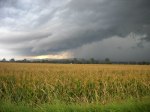Environmental Linkage Grants
 Congratulations to Environment Institute members Professor Alan Cooper and Professor Gus Nathan in securing funding in the following linkage projects:
Congratulations to Environment Institute members Professor Alan Cooper and Professor Gus Nathan in securing funding in the following linkage projects:Alan Cooper
Identifying the diversity and evolution of loci associated with adaptation to aridity/heat and salinity in ancient cereal crops
Project Summary
This project will use ancient grains of wheat, barley and rye to find 'lost' genetic diversity at key genes associated with resistance to aridity, salt and disease. This project will make the proteins of key genes, and study their interaction with the environment over time by measuring ions in the grains to reveal the ancient environmental conditions.
The role of epigenetic modifications in bovid adaptation to environmental change
Project Summary
This project will explore the role of epigenetic change, where gene expression is regulated without changing the deoxyribonucleic acid (DNA) sequence, in how animals adapt to rapid climate change. This project will trace epigenetic markers in ancient bison and cows through 30,000 years of climate change, and identify key adaptive genes for the cattle industry.
Gus Nathan
Oscillating water column efficiency improvement through impedance matching and active latching control techniques
Project Summary
The coastline of southern Australia is recognised as a world-class wave energy resource. This project will play a crucial role in seeing this resource exploited whilst simultaneously keeping Australia at the forefront of wave energy technology. Specifically, this project will develop a high-efficiency turbine technology for wave energy.

Newsletter & social media
Join us for a sensational mix of news, events and research at the Environment Institute. Find out about new initiatives and share with your friends what's happening.
